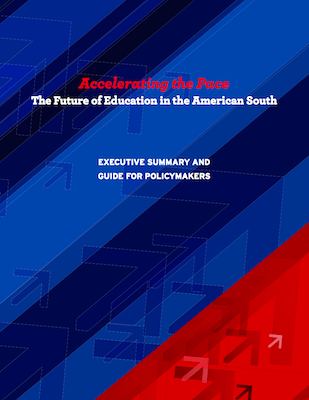This week, A+ has joined with six peer organizations across the South to release an important report calling for more attention to improving education in our states.
Accelerating the Pace: The Future of Education in the American South calls for us in Alabama and neighboring states to move faster to raise the quality of education. While the region has made major advances in education in recent decades, some achievement gaps between more affluent students and historically disadvantaged classmates widened between 2005 and 2015.
Alabama has made significant increases in reading, meeting the national average in 4th grade reading for the first time in 2011. However:
- Gaps widened for black 4th graders in math and for Hispanic students in 4th grade reading and math and 8th grade reading.
- Gaps also widened for students from low-income families in 4th grade reading and math and 8th grade math.
The report and accompanying poll results
are online at www.acceleratingthepace.org.
While some of our challenges in improving education are daunting, we’re encouraged that much consensus seems to be emerging on which key issues in education to address.
“If schools do not help more students catch up more quickly — even as they raise expectations for all children — the region’s economic prospects will worsen. In some areas, they already have. Now is the time for states to develop a long-term vision for improving education so that many more children can succeed in school and life,” the Accelerating the Pace report says.
The report calls for state leaders to focus on four main priority areas for improvement:
- Make the South the best place to teach. We need even more teachers and principals who have the talent, preparation and continued support to help students succeed.
- Provide new types of academic—and nonacademic—support for today’s students. Students need more support systems for dealing with family and emotional health issues that can impact their learning.
- Clear all students’ paths from high school into their next steps. Some students still don’t know what to do after high school. Let’s build a much stronger bridge from high school into college, career training or a good job.
- Ensure resources are adequate and targeted. Invest in education to meet the needs of every child, and consider additional support for students who need the most help. It’ll pay off for all of us.
These priorities were shaped through interviews and discussions with stakeholders and other experts in the Columbia Group states.
 The report and results of the accompanying “Education Poll of the South” are from A+ Education Partnership and the Columbia Group, an informal network of organizations that work to improve education. The members are: A+ Education Partnership in Alabama, Georgia Partnership for Excellence in Education, Prichard Committee for Academic Excellence in Kentucky, Education’s Next Horizon in Louisiana, Mississippi First, the Public School Forum of North Carolina, and SCORE in Tennessee.
The report and results of the accompanying “Education Poll of the South” are from A+ Education Partnership and the Columbia Group, an informal network of organizations that work to improve education. The members are: A+ Education Partnership in Alabama, Georgia Partnership for Excellence in Education, Prichard Committee for Academic Excellence in Kentucky, Education’s Next Horizon in Louisiana, Mississippi First, the Public School Forum of North Carolina, and SCORE in Tennessee.
The report specifically highlights Alabama’s progress in expanding state-funded, high-quality pre-k, as well as efforts to train and support teachers across the state.
The accompanying Education Poll of the South shows that most Southern voters clearly want better educational opportunities for every child in their state, no matter students’ background or where they live. The poll surveyed 2,200 registered voters in 12 states. Among its findings:
- 74 percent of voters in the South (77 percent in Alabama) see differences in the quality of education available for students across their states.
- 85 percent of voters in the South (83 percent in Alabama) support “improving public schools by addressing differences in the quality of education across all schools in the state.”
- 84 percent (and 81 percent in Alabama) support their “state improving public schools by addressing differences in funding across all public schools.”
These findings are from voters who roughly match the political affiliation, gender, income levels, and racial/ethnic backgrounds of registered voters in each state.
In today’s political environment, we can get caught up in the rancor from our point of view. Education is one issue that’s too important to get caught up in the rancor of politics. This is about our children’s lives and the health of our communities, and it’s something all Alabamians can work toward together.
Please join us as we engage state leaders, business people, parents and students, teachers and school leaders, and others in this dialogue about the future of our state.

0 Comments on "Four Ways Alabama Can Make Progress in Education"